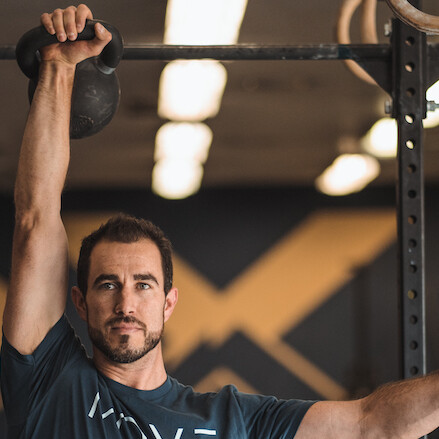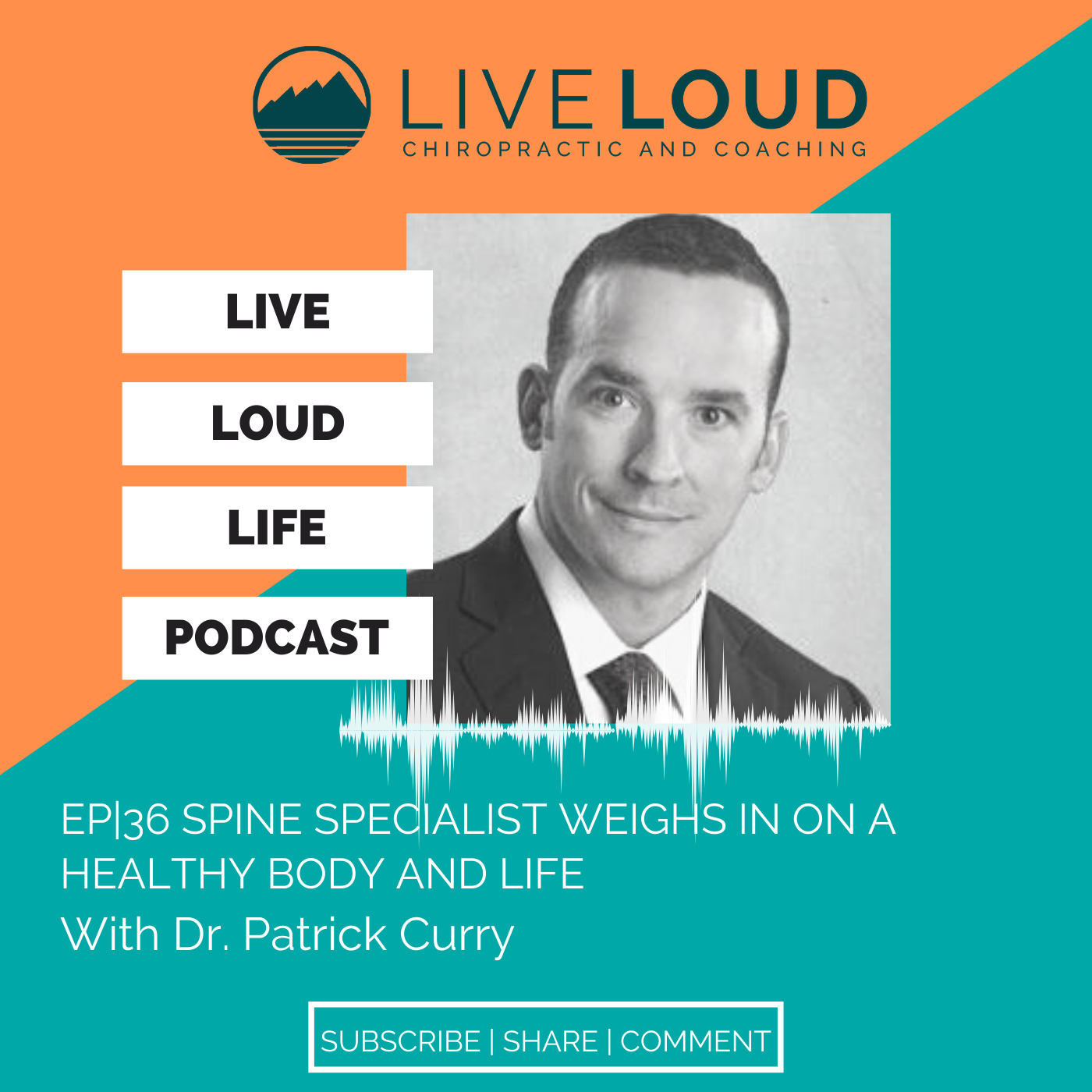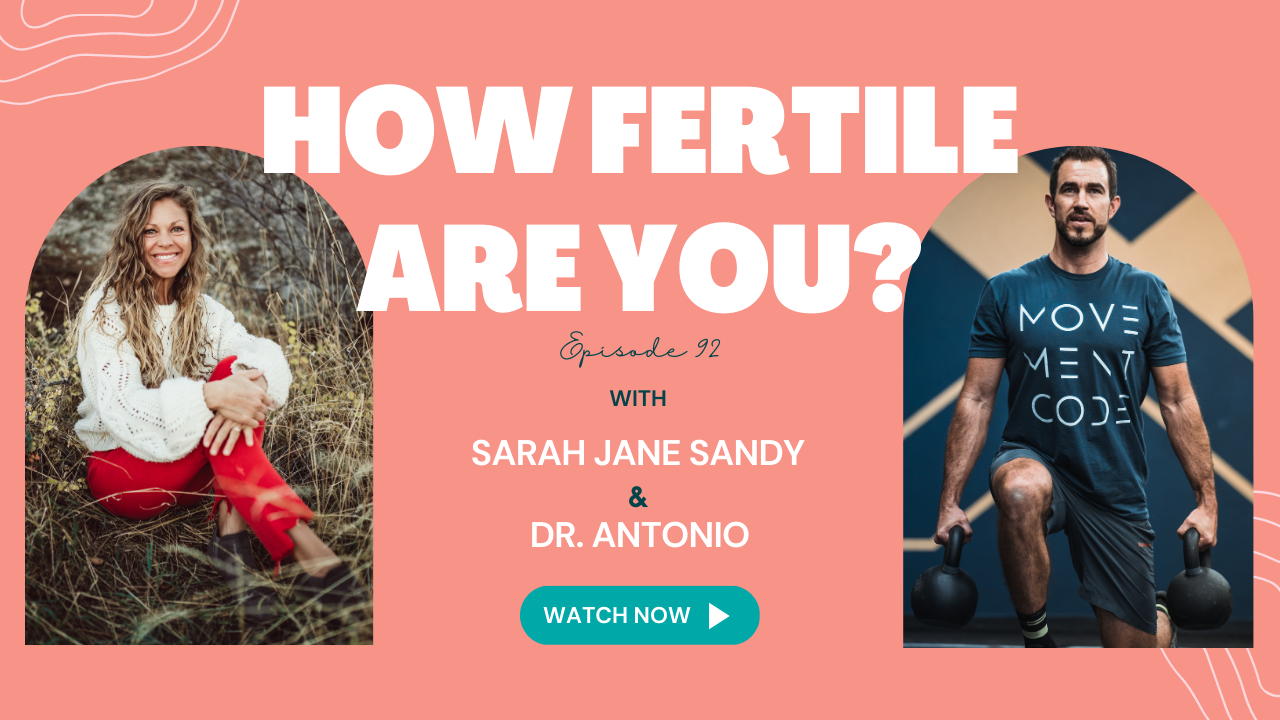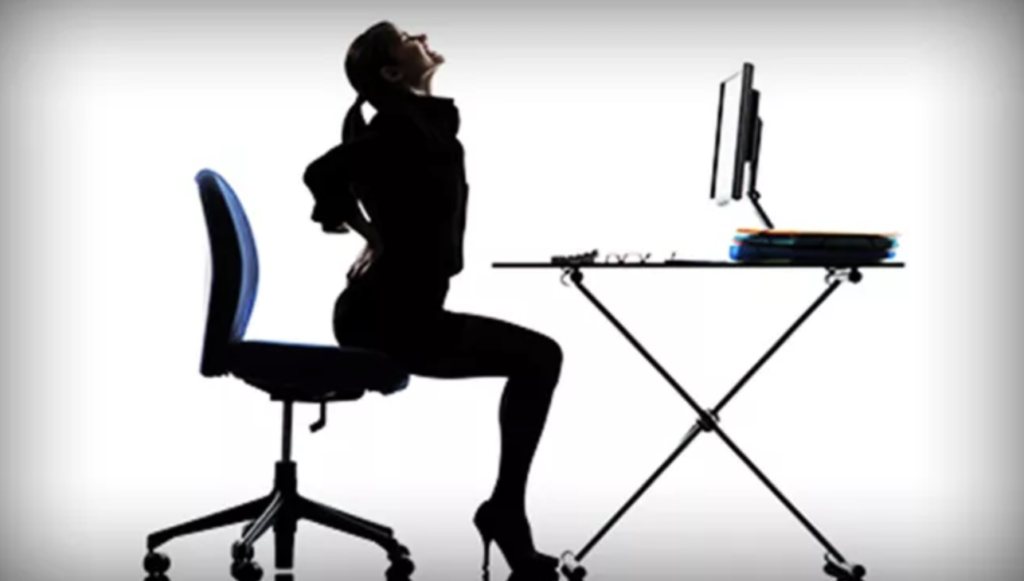Live LOUD Life PodcastLafayette Colorado
Episode 68
Getting Over Fear of Injuries and Pain
With Dr. Antonio Gurule
Having an injury or pain is never fun. Being able to set up a plan helps you gain the confidence you need to overcome the fear associated with pain and injuries in a progressive way.
Episode Highlights
5:00 – The importance of building confidence around past injuries
8:00 – Digging into what patients were previously told about their injuries
10:00 – Compression and slump test for back/nerve pain
13:00 – Giving the patient what is best for them as an individual
18:00 – Exposure therapy– “Dipping your toes in the water”
About Dr. Antonio Gurule

Background:
- Father
- Doctor of Chiropractic
- Owner of Live LOUD
- Personal Trainer & Health Coach
Check Out Some of Our Other Blog Posts and Podcast Episodes
Anthony Gurule 00:09
Welcome back to The Live Love Life podcast. My name is Dr. Antonio, your host of The Live Loud Life podcast. And I’m just so grateful to have all these different mediums of sharing, you know, information and whatnot. I think today, our generation more than ever, it’s honestly, I was reflecting upon this the other day with, you know, a friend. And we were talking about how, you know, when we were in middle school, we used to get my mom used to give me 15 cents to call her on this on the payphone in the mall, when the movie was done. So she can come pick us up. And it’s just, it’s just, it’s so funny, because this is just, what 20 years ago, and what our parents have gone through and what that next generation is, and what generate like my grandma, you know, Nichelle’s grandma grandmother who just turned 90 is still around, it’s just, it’s just, it’s just mind boggling. The amount of information that’s being passed around how fast informations changing and updating for, for better or worse for, you know, we’re not getting into the debate of that, and in just in just how we can communicate and share your thoughts and how, more importantly, you as a, as a consumer, if you want to call it that, but more so you as someone who is curious, can can can google or youtube anything and find a resource that teaches you or explain something, from Khan Academy to Udemy to all these different things. It’s amazing. And, you know, I hope that we can, through our, through our somewhat specific knowledge, shed some light on some situations and some issues that are beneficial to you to family members to loved ones. And that this could, this could help you in some way.
Anthony Gurule 02:11
And that’s what I honestly my biggest struggle and getting hung up on is trying to not perfect this but like what do you want to know? What do you what do the listeners, are curious about? My curiosity? Obviously, you sheds in certain ways, and I think that, that peels off and is shared with other people. But you know, I do want to make this relevant. So if you have comments and suggestions and topics, we always love hearing those to better suit these conversations about certain topics.
Anthony Gurule 02:48
now, basically, so I obviously have expertise in certain areas and not other areas. And if it’s something I don’t know, hopefully I’ll bring it be able to bring on a guest and share their thoughts and their knowledge. But today, we’re going to, you know, not a lot of housekeeping. This is my new office, we’re pretty amped, don’t mind the mess on some of that stuff. We just moved into a new property, I was hoping to actually shoot this particular episode on my new deck with this view of the mountain range and whatnot.
Anthony Gurule 03:18
But we’re super blessed. With this new home having a little bit more space for our homeschooling opportunity, to take full force with our kids getting dirty in the mud and exploring with toads and worms and chickens and ducks, our neighbors have horses. So it’s a pretty wild opportunity. And we’re just obviously super fortunate and blessed to be able to, to embark on this new journey. So with that, I’m hoping we’re you know, obviously a lot of time and effort being put towards getting the house set up. But utilizing our garage space, which is not massive, but being able to create some more content in the garage gym, around certain things and helping people move better. helping people understand how to how to kind of manage pain, how to move better, while managing pain, you know, kind of blend those things at the same time. How to be more mobile, how to get stronger, and that’s what I feel I’m best at. I’m not the best with nutrition, I’m not the best with hormones, um, you know, those are, those are important topics. I’m not downplaying those. I just don’t enjoy working with that stuff as much and I have a number of colleagues who I refer to out for that stuff. So if you have some concerns about those things that happy to bring those people on, but if you’re, if you’re wanting to get stronger, move better and eliminate your pain, you’ve come to the right place.
Anthony Gurule 04:53
If you want to live an adventurous life and live loud and not feel limited by previous injuries. or hesitations or reservations, about being scared about, you know, your injuries or that maybe injuries your parents have might have had, and trying to build some confidence around that. I know we can help you out with that. And that’s an that’s an in, I intentionally kind of lead us use that to segue into our conversation today, which is how to create confidence. And this in particular cases is about lower back, but how to create confidence after an injury. And that is one of the more challenging tasks when we’re dealing with recovery, how do we get you to feel more confident in your, in your abilities in your strength, in your, in your balance, you know, whatever that might be following an injury and, and in particular, what we’re talking about here is lower back and, and you know, it’s one of those, it’s one of those things when it rains, it pours like, you know, like, every now I’ve seen a ton, I see I see a ton of low back cases. But it’s one of those things like when you when I started seeing, like I get a couple of severe or like acute things. And I see a couple more. And the the theme, this week that I came across was this massive hesitation and reservation of having a disc injury, or back pain. and the hesitation or reservation, rightfully so we’re not discounting, you know, or downplaying what their fears are. But one in particular individual was worried that they re herniated, or had another disc bulge or injury, they previously had a discectomy from a sequestration years ago. And now they’re having, you know, fairly substantial radicular pain, which is referred pain down the leg with numbness and tingling and some burning, all of which are typically associated with the pinched nerve root, which is usually usually a response to inflammation and possibly a disc bulge or disc herniation.
Anthony Gurule 07:12
So you know, rightfully so they had a long road to recovery with a substantial injury such as this, this previous disc injury, and then this other individual, not as severe, but it’s been this like, underlying chronic thing that has just really been not, not robbing them, like she’s able to run, not run sorry, ride her bike and swim and do a fair amount of exercise. But her big hesitation is, I don’t want back pain, because my mother has suffered with back pain for over 35 years. So she feels that if she was to have back pain, she would end up like her mother, which is basically, you know, I wouldn’t say disabled right now. But as she describes it, she’s not able to do really much of anything. And so we have these two, although similar, you have very different cases of individuals who are extremely fearful of the diagnosis and the prognosis as it pertains to lower back pain. Now, this is where, as a clinician, you need to be very careful about your words.
Anthony Gurule 08:23
And we’ve had, I’ve had specific conversations up with both of these individuals about what they have been told, because I want to set, I want, I want to set the framework, and I wanted to know, the lens that they’re looking through and the perspective that they have for what they were previously told. And I don’t think their conversations with the practitioners were wrong, per se. But there’s a certain bedside manner, as they call it, that is needed when approaching sensitive topics such as these. And this is this is very true, you know, for conversations with pregnant patients, such as diastasis recti. For infants with tether oral ties, but it is our role and responsibility as clinicians for us to tell the truth based on what we believe to be true based on and support and giving supporting evidence. That’s the biggest thing. Because I think there’s a lot of clinicians who believe something to be true, but don’t have necessarily concrete supporting evidence. And that is, again, a debate for another time which we will not get into. This is always that’s obviously more of a, quote unquote, clinical debate.
Anthony Gurule 09:41
but we, we did a few specific tests. After our history and examination after the history examination for both these individuals, I, I fairly definitively knew where the quote unquote The epicenter or started the pain was, you know, based on the questions we asked the symptoms are describing, so on and so forth. And then we do a few, we do a few tests, and the tests are provocative tests. And the whole point of provocation tests is to provoke is to manipulate and shape the individual and push in, in pride in compress and stretch to determine what the source of where the pain is coming from. Now, this is where things get confusing, because when you chase the sight of pain, that’s where things can be a little bit muddy, right?
Anthony Gurule 10:39
Obviously, this one individual has pain on their legs, so we’re not examining the leg, because it has a very clear, clear dermatomal ridicular pattern. And the other individual had what she described as hip pain as she points to her glute medius, inside hip butt area. And she describes it as hip pain. And everyone keeps saying, well, it’s not your hips, your hip’s, fine, but they didn’t give her an answer as to like, why it’s actually hurting. And we know we did a more extensive test. But what we what we started with was a simple compression and slump test. So we have her sit into a chair. So if you’re dealing with lower back man justice, you do suggest you do this as we describe it, because I don’t want you to flare something up. But you sit, you sit up nice and tall, kind of towards the front, you grab the bottom of the chair, and you pull yourself into the chair as you’re compressing your spine, right? And we do this in a nice upright posture. Where our, you know, the curve of our spine and everything is supporting us. No pain. And we simply asked her to slumped, massage into her lower back, so her lower back is now flexed forward, and she leans forward, and then she pulls down on the chair again, and lo and behold, what hurts,?not her back. Her hip!
Anthony Gurule 11:53
So we start to ask then, what, what was the only variable we manipulated the pelvis tucked under a little bit, not that much. And so realistically, the only variable that we manipulated was lumbar, flexion and compressing the lumbar spine under more flexion. And that created a referral pain down into the hip. So the hip where she is feeling all the symptoms is not actually the source of what’s actually wrong.
Anthony Gurule 12:23
And same goes through for the individual with the leg pain, we performed a very similar test, and we were able to provoke some of the symptoms and we we tread lightly when someone’s that acute with leg pain, because we don’t want to piss things off a lot, we have a pretty good amount of information, part of the diagnostic process for provocation test is also reduction of symptoms. So if I can do certain things that I know decom–, quote, unquote, decompress the spine or open something up and things get better, we’re like, Okay, well, it seems like this is probably the cause, because we were able to eliminate the pain. So both are true in both directions. And, and this is what’s important, because with both of these individuals, they never had an examination or an assessment like this. And the assessments were all tailored around where the site of the pain was. well, moreso for the hip individual, the previous individual with the leg pain, again, that’s pretty cut and dry thing as a clinician, you’re not missing that. The big fault. This is a side note, the big fault with his case previously, was the insurance model and how it screws over the patient.
Anthony Gurule 13:27
And I know insurance is great. And it helped cover a lot of obviously the big costs for these things. And I agree. I agree that a conservative bout of care needs to happen before you go through more extensive treatments such as MRIs and injections and things like that. But what I have learned over the years is having the ability to go outside the lines every now and then to give the patient what’s best for them. If a patient is dealing with severe burning pain that we assumed to be a result of a disc herniation and inflammation, they oftentimes are not able to get steroid injections and oral medication until they go through about a care. And I think that’s wonderful. I think that’s good. That’s what I do. Like I agree with that. But I have found in my years that if someone’s okay with doing a steroid, it might be the difference of them having a horrible life for weeks and months and door getting a little bit better and getting some momentum in the right direction.
Anthony Gurule 14:36
And so this individual was getting spotty injections because they weren’t able to get an MRI yet because it wasn’t authorized through insurance because they weren’t done with their 12 sessions a PT so you know it gets it’s it’s unfortunate that it goes that way.
Anthony Gurule 14:51
But bringing all this back so this individual, obviously having back pain before and now Dealing with something similar. He’s just like, what is what’s going to happen like, I do not want to I cannot do surgery again. So obviously has major reservations about it. then the other individual, whose mother has been suffering with back pain for 35 years, like, I can’t have back pain. My mom’s had back pain, like it’s genetic. It’s, it’s something that I know will haunt me for the rest of my life. And so we had, you know, after we did the provocation test and kind of determined severity, I immediately go into how can I help you make your pain better like this. And we have a handful of exercises, I’ve gone through these exercises multiple times in a number of different either videos or podcasts episodes, we have some YouTube videos that show how we treat low back pain and neck pain, this pain, we’re going to film those again, because those became I ramble on those became way longer than I wanted. So I’m going to condense those to make them better for you.
Anthony Gurule 15:50
And recently, we had a testimonial of a previous college athlete who had a failed microdiscectomy as well. And she’s back to deadlifting. But we start with, we start with a few different exercises to help you help you find ways to reduce your pain. Now, if I can teach you how to do that, in between our sessions, you can go home, and you have so much autonomy and power to be able to handle the pain that you’re experiencing, will it be will it will it go away, maybe maybe not. But if you’re going day in and day out, like sweating bullets, not knowing when the next time your back’s gonna lock up on you, that’s a shitty way to live. That’s very, it’s very, very challenging to go day in, especially if you’re a parent and you have kids, I can’t pick up my kid, I can’t do this, this and this, that’s tough. But when you have a few different things, and a few different tools, and you’re like, Well, you know what, I know it’s not gonna be perfect, but I got I have these things, and I feel good with them. Because they make me feel good. There’s power in that. And so we give the diagnosis we give our thoughts we support it with we give evidence support, or based on our examination, and we say Hey, this is what we think is going on this this why why bla bla bla, that disc this, it disc that the nerves, this the muscle spasms here. that we’re for pain, so on and so forth. But I’m going to show you how to handle that. And right away, we teach them those things. And like, wow, this actually feels great. This is the best I’ve felt in days, weeks, if you know, I feel like I can actually walk I feel like I have, you know, a little pep in my step. And, and so then we come right back is like, Hey, you remember that thing you were so scared about? How do you feel about that? Now, are you still as worried as you were before and 99% of the time, like, you know what? No, I feel better about it. it’s not gone. But yet their worry And their fear associated with it has gone down because they have they have more control. It’s the unknown and the lack of control for the majority of us, that makes it so challenging. And whether it’s, you know, the lack of control, because you’re dealing with something that someone else has, and you’ve heard, or you’ve seen them gone through it, or you or yourself has gone through it. And you don’t want to go through that again. But you were never given the tools to get a grasp of this.
Anthony Gurule 18:10
Now this, again, is just the tip of the iceberg because we’re just trying to manage the immediate, and there’s yet still a rebuilding process of building confidence. And, and that’s the next phase through various forms of stability, mobility, and this is true for all regions of the body, not just lower back, I, you know, I wanted to state that. So it’s not unique to just lower back.
Anthony Gurule 18:37
But I just completely lost my train of thought, oh, confidence, but just like anything else. And, you know, I’m a big fan of Jordan Peterson, clinical psychologist in, in Canada, who describes when someone’s afraid of something, the worst thing that you can do is remove them from that situation. Right? We have so much fear around certain things that by taking yourself away from it is not the right thing to do. Now, throwing you down in deep end is also not right. But we call it exposure therapy.
Anthony Gurule 19:17
This is something that has been known for a very long time, right? And so, you know, I call it exposure therapy, I say dipping your toes in the water, you have to try the thing that you’re afraid of. And if you have the support of the clinician’s eye watching you, you feel better about doing it. And, you know, I’ll guide you, I’ll cue you, I’ll help you. And as you’re able to do the exercises, the movements or the things that you’re afraid of without pain and feeling better, This light bulb goes off in your head, and your body starts saying oh my gosh, this is great. It doesn’t hurt.
Anthony Gurule 19:57
And you have this kind of this aha moment and glimpse into the future of what’s actually possible. In an instant of time, we’re just like, wow, this is crazy, it doesn’t hurt and the thing that I love the most is when someone like does a rep and they’re like, ah, oh my gosh, this is horrible, it hurts. And then we kind of just help, you know guide position, whatever that is and they do it again, it’s like I don’t feel it at all, you’re just like you know and see, see what’s possible?
Anthony Gurule 20:26
And and then we have a conversation about the future about what we’re able to do what we want to be able to do so on and so forth. So I want to leave you with some encouraging guidance that there is, there is the possibility of being able to do more. I don’t know what you’re going through, I don’t know the injury, the aches and pains, the history of what might be going on. But if you feel like you’re at the bottom, I promise you, there’s only up to go. And what’s beautiful about that is you just need to find the right door.
Anthony Gurule 21:10
I might give a suggestion, and it doesn’t work. That doesn’t mean what we’re doing is wrong. It doesn’t mean what we’re trying to attempt is not the right thing. You just have to try another door. There’s many roads to Rome. And when you find the right path for you. Hopefully, it’s hopefully it’s an avenue that you enjoy. It’s not always that way. But I promise you that things will get better. It takes dedication, it takes patience, and it takes commitment, just like anything else. I’m guilty of it more than anybody else, the quick fix, the want this done now. But it’s the it’s the daily grind. And if anyone has, you know, the the perfect saying or way to bring this all together, I would love to hear it. But it is again, it’s the daily grind. No one wants to hear the journey is better than than the destination because everyone’s thinking about the destination. And I agree with you. It’s much better to think about the day where you feel amazing. But it’s the day and day and commitment of movement, mobility, stretching, stability, training, eating, right, sleeping, right, all of these things that create the more resilient body that will allow you to feel confident to overcome the current hurdle that you’re on, and any other hurdle that you might be coming across as a result of life.
Anthony Gurule 22:32
Here’s a newsflash for you, you’ll feel some pain in your life. This won’t be the last time. But if you got someone on your side, hopefully live out chiropractic and coaching can be that team for you, to workshop to navigate to be a sounding board for these things, that makes it a lot easier. Rather than waiting till it becomes like this chronic thing that’s been festering for five to 10 years, stomp on it. If you feel good about trying to explore your own body and figure it out all the power to you, that’s what we’re about.
Anthony Gurule 23:07
But if you have any sort of reservation just reach out to someone, it’s a lot easier to just say, Hey, I got this thing going on. I’m not quite sure what it is, you know, it’s new, it’s not horrible. But I don’t want it to get into something it’s a lot easier to deal with an issue before it becomes an issue. And when given the appropriate suggestions. more times than not you’ll just take care of it. So I hope that this has provided some of you some more confidence about what’s what could happen. What sorry, what’s what’s was waiting for you as far as the ability to move the ability to be stronger, the ability to be pain free. the ability to enjoy the things in your life, without the hesitations and reservations because you have confidence in your back and your ankles and your knees and your hips, whatever that might be. There are resources I guarantee even if you said you’ve tried PT chiropractic massage, orthopedics, MD whatever it is, I guarantee I guarantee that there are things that you have not tried and or it was not just the right time for you that will help you live a louder life. So until next time, folks, live loud.
–




